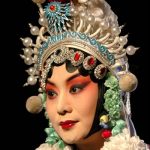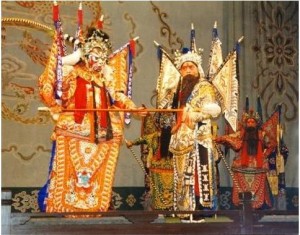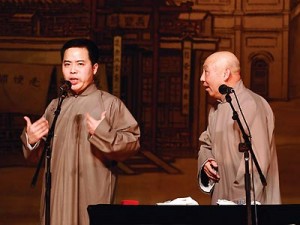Beijing Opera (京剧) Posted by Stephen on Sep 30, 2011 in Culture
 Beijing opera or 京剧 (jīng jù) is a traditional form of Chinese theater which combines music, vocals, miming, dance and even acrobatics into the performance. Beijing Opera arose in the late 18th century and became fully developed and recognized by the mid-19th century as traditional art form. Beijing Opera was extremely popular in the Qing Dynasty court (who were northern Manchus) and has come to be regarded as one of the (many) cultural treasures of China.
Beijing opera or 京剧 (jīng jù) is a traditional form of Chinese theater which combines music, vocals, miming, dance and even acrobatics into the performance. Beijing Opera arose in the late 18th century and became fully developed and recognized by the mid-19th century as traditional art form. Beijing Opera was extremely popular in the Qing Dynasty court (who were northern Manchus) and has come to be regarded as one of the (many) cultural treasures of China.
If you go to Beijing or Northern China, I urge you to attend an Opera. It is like nothing you will ever see in western theaters. The sounds, the peacock-like costumes, the wails and the acrobatics. It’s really an all in one show!
Peking opera features four main types of performers who are included into one large troupe, that eats, sleeps, lives and travels together. In a performance, costumes are very ornate and elaborate as performers are the only focal points on Peking opera’s characteristically sparse stage.
The performer use their gifts of speech, song, dance, and fleet of foot, to create symbolic and suggestive meanings for the audience, Most actions are implied abstractions, rather than realistic events happening on stage. Hence understanding Beijing opera is very difficult, even if you speak the language. It’s all about subtlety or some reference that few know about. Understanding the movements, costumes and speech is integral to understanding the storyline. Think of it as a Chinese Shakesperian play. I mean…you guys read the cliff notes right? Wherefore art thou means “Why are you? not “where are you”. So confusing…
Thus physical action is a huge part of Beijing Opera, and the skill of performers is evaluated according to the beauty of their movements. Performers also adhere to a variety of stylistic conventions that help audiences navigate the plot of the production, otherwise they would be somewhat lost. The layers of meaning within each movement must be expressed in time with music, so you will see lots of pauses followed by jerking movements and then lingering pauses.
The music of Beijing opera can be divided into the Xipi and Erhuang styles. Melodies include arias, fixed-tune melodies, and percussion patterns, including some that we’ve already covered in a recent post on Chinese Traditional Drumming (Click for post). Like pre-modern theater in western cultures, Beijing opera is almost exclusively performed by men (in fact prior to the 20th century it was all males)
Beijing Opera is vast and includes over 1,400 works based on Chinese history, folklore, and now, increasingly on contemporary life.
Major performance troupes are based in Beijing and Tianjin in the north, and Shanghai in the south. The art form is also preserved in Taiwan, where it is known as Guoju 國劇 (Guójù) which translates as “National Opera”. It has also spread to other countries such as the United States and Japan.
History and Revitalization:
Peking opera was born when the ‘Four Great Anhui Troupes’ brought Anhui opera, or what is now called Huiju, to Beijing in 1790, for the birthday of the magnanimous Qianlong Emperor. It was originally staged for the court, but was so popular is soon became available to nobility and later the public.
In 1828, several famous Hubei troupes arrived in Beijing and performed jointly with Anhui troupes. The combination gradually (by the mid 1840s) formed Peking opera’s melodies that you hear today.
Beijing Opera was very popular until the beginning of the 20th century, when scholars and political activists started questioning the role of “ancient culture” in modern times.
Later, During the Cultural Revolution, classical forms of opera, including Beijing Opera were denounced as ‘feudalistic’ and ‘bourgeoise’ and were replaced with the eight revolutionary model operas as a means of propaganda and indoctrination. But after condemning Opera for decades, the Open Door Reform Policy brought a revitalization of ancient Chinese arts and relics (such as Kung Fu, Calligraphy and Opera), mainly through tourism and commerce. Is there a Beijing Opera called “To Get Rich is Glorious”? No…probably not, because for whatever reason, Chinese people don’t give Deng Xiao Ping enough credit.
In recent years, Peking opera has attempted numerous reforms in response to sagging audience numbers. While tourists flock to these performances, younger generations (with as little understanding about Beijing Opera as a foreigner) are turning their backs and are gravitating towards modern, more hip forms of entertainment. To draw in younger generations, Opera reforms have included the adaptation of new performance elements, along with performing new and original plays.
Unfortunately it has been met with only mixed success. While hybridized forms of modern plays can be adapted to the Beijing Opera stage, it is such a refined and precise art-form that it’s really hard to deviate much from traditional styles without losing the subtlety and beauty of the performance. After all, you wouldn’t go back and rewrite Hamlet, now, would you?
Follow Steve on Twitter: @seeitbelieveit

Build vocabulary, practice pronunciation, and more with Transparent Language Online. Available anytime, anywhere, on any device.
About the Author: Stephen
Writer and blogger for all things China related. Follow me on twitter: @seeitbelieveit -- My Background: Fluent Mandarin speaker with 3+ years working, living, studying and teaching throughout the mainland. Student of Kung Fu and avid photographer and documentarian.






Comments:
Peter:
A very informative piece, thank you. I hope one mistake could still be corrected as it was intended: it was very popular until the beginning of the 20th century, not the 21st! I would personally give more memorable mention to the other forms of Chinese opera, saying at the beginning not that it “is a traditional form of Chinese theater”, rather that it is one of the lots of forms …
Steve:
@Peter Thanks for the catch, Peter. Definitely meant 20th century. I’ll be covering other forms of Chinese theater and Opera in later posts. I’m just so fond of Beijing Opera that I had to start here!
-S
Simone:
@Steve Beijing opera actually achieved its peak in the 1930s and 1940s when the four great masters for female roles arose. Anyway, I’m very glad a western likes it.
Simone
Yoli:
To me this is endlessly fascinating. Thank you for sharing.
Simone:
Very well written Beijing Opera! But the best part of Beijing Opera still lies in its singing. That’s why in the past the fans would say I’m going to listen in the theater instead of saying I’m going to watch the performance! Unfortunately few people would be patient enough to sit there! It is a complicated problem, linked to history, the era , the development of the opera itself, the actors and also the audience. One cannot condemn just the actors or the young people now. Anyway, it’s great to read your article and see some westerner likes it!
Simone:
The decline of Beijing Opera is a very complicated issue. It is connnected with history, the actors and also the audience. Frankly speaking today’si-cul performances are much less good than the past ones while today’s audience don’t even go to the theater. One thing is that it is a multi-cultural and more open society, the other thing is that the traditional education is not really emphasized. Even if an opera teacher or an opera troupe offer to enter a school will a principal greet them?But thank you so much for sharing and I am very glad a westerner finds it fascinating. Can you tell me which piece of Beijing opera you love the best?
Thanks